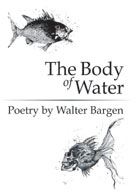
Timberline Press, 122 pages, 2003
$20.00 (Illustrated by Mike Sleadd)
Selections:
HOUSE OF TURTLE
I can’t tell you where to start, maybe I don’t know,
or maybe I’m simply not ready for the responsibility,
though it has nothing to do with not wanting to help,
nothing to do with all the possible guilts that sweep
over us for not having loved enough, or been present
enough, or even not having stopped the car and moved
the turtle off the road, and finding the flattened mess
when we returned, having watched in the rearview
mirror another driver intentionally swerve. We must
take into account another time it was hopeless,
or just pointless, when we had not yet surrendered
hope, when the pond by the highway was drained
for a new apartment complex, the backhoe with its
claw sunk for the night into the breached embankment,
waiting for morning to again swallow another mouthful
of earth and spit it out. What more could be done,
the quitting-time traffic no longer able to dodge
those orphaned by the air, who crawled for other waters,
and over the asphalt the hundred or so moss-backed
shells were cracked and savaged flat. Perhaps this is
just a warning, like the children standing in a down-
pour shouting over whether running or walking
through the rain will leave them drier, even as the rain
falls harder, drenching their most refined arguments.
HIGHWAY FIFTY WEST
The engine is insistent, hungry, demanding to be fed more miles.
The windows rolled down, the long zipper of September locust
song is undone and falls into the rags of distance. In the last town
without a stop sign, light neatly folded the clapboard houses
into the envelope of long shadows. Even vultures are hungry
for the road, following it more closely than drivers, they tilt
and swivel their awkward wings low over the gravel shoulders
for what has left a humped stain. The Roman Emperor Nero commanded
Seneca to suicide, perhaps for telling him that if he wasn’t happy
with what he had, which was all the known world, it wouldn’t matter
if he possessed even an unknown empire. But then history’s fatal
collisions are not the same and will not be remembered on this road,
but relived in the small plastic-flowered crosses by an overpass.
The scarlet rash of sumacs bleed up hillsides. The sharp blue edge
of horizon cuts above soybean fields. In the drainage ditch cattail blades
are honed on yellow shafts of afternoon, and in the turbulent wakes of
passing traffic can be heard the clatter of ancient duels, frog and snake
fattening for hibernation. The bald monuments of road-cut rock display
the scars of exposure, drilling and dynamite, and begin to glow in the full-
face of late sun. On a tarnished plaque below a statue of Columbus in a square
in Barcelona, on a similar sunny fall day, can be read the inscription: “You
have to navigate. You do not have to live.” On this road that we desperately want
to disobey—it makes no difference if we suddenly wrench the steering,
swerve, hit or miss, we crash through the bronzed light of evening.